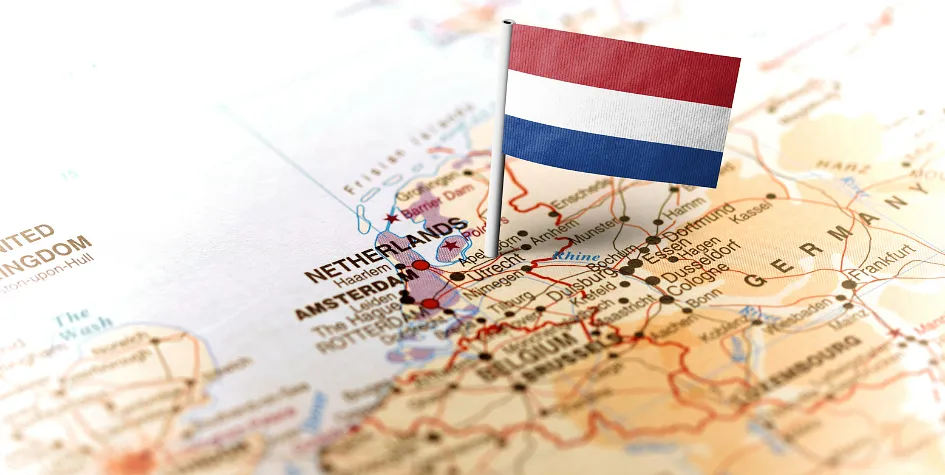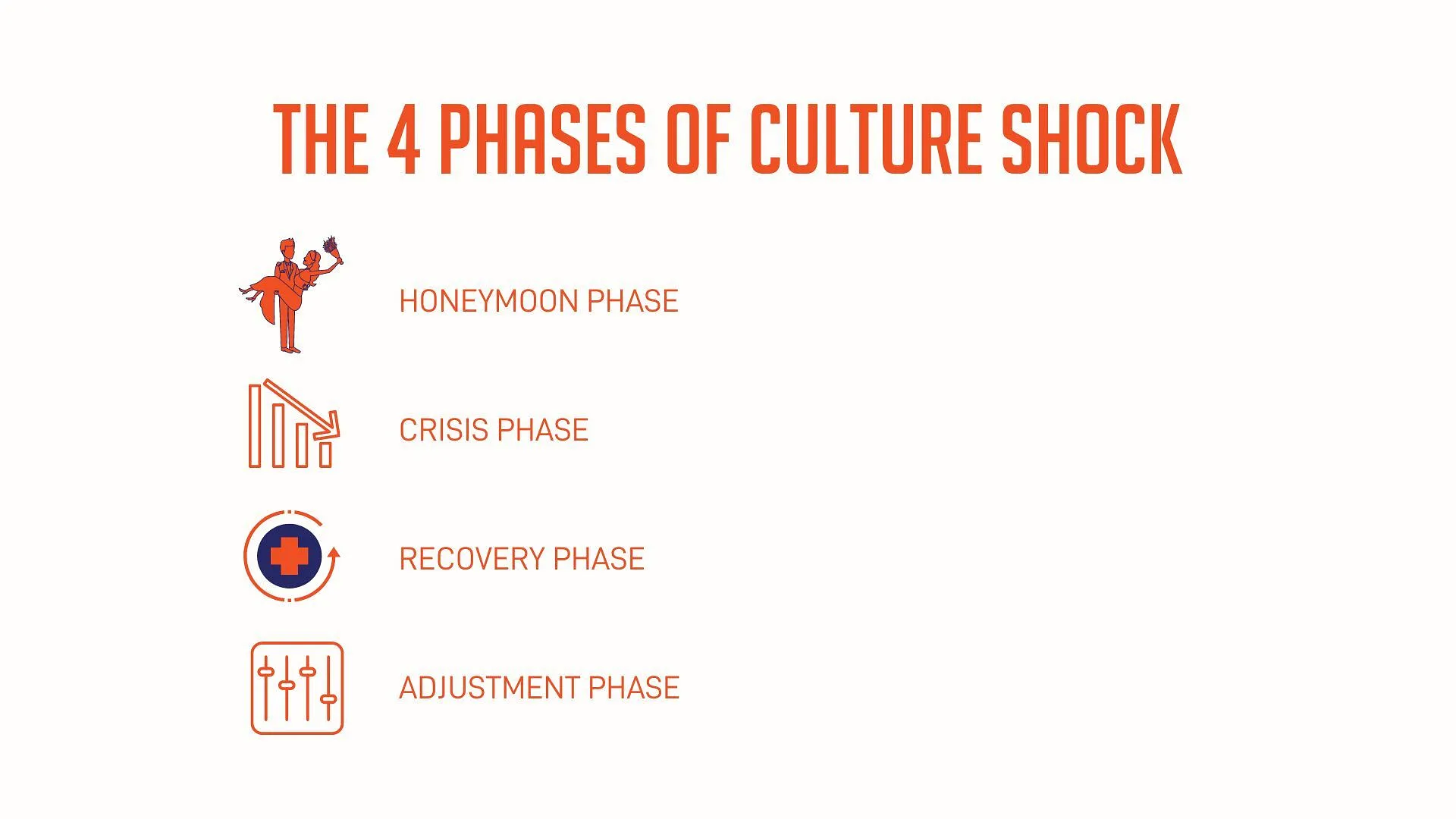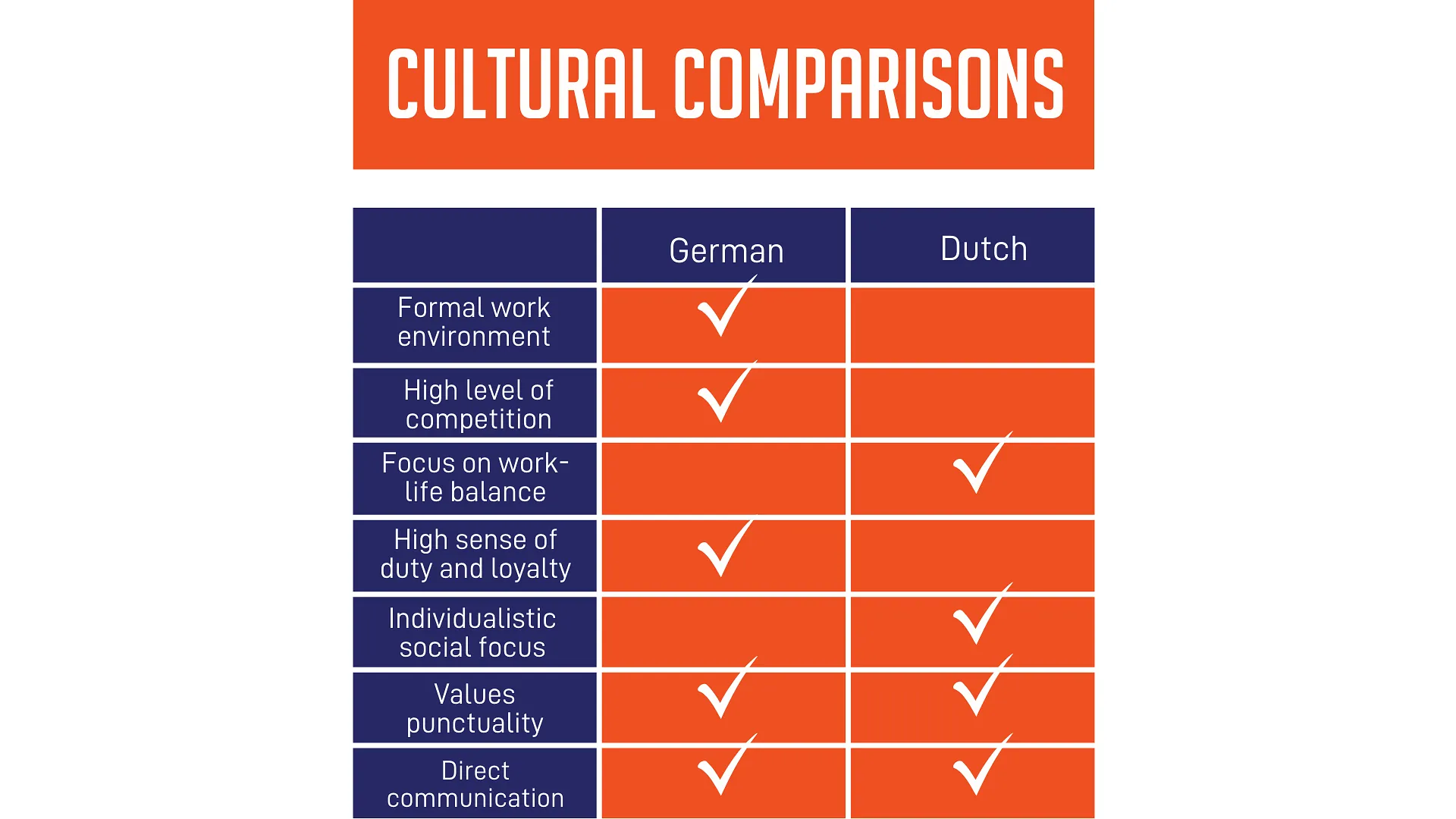Always up to date to find your dream job!
We only need a few personal details, thanks!
Moving to a new country is usually an adventure filled with excitement, challenges, and unexpected surprises. My journey from Germany to the Netherlands was no different. Having lived in the US and the Netherlands before, I thought I was well-prepared for another move. However, each relocation brings its own set of unique experiences, and this move was meant to be more permanent.
This story is about my culture shock journey, highlighting the highs and lows and the striking contrasts between life in Germany and the Netherlands.
My fascination with the Netherlands began during a winter vacation in Switzerland, where I met some Dutchies at an Après Ski celebration. Their openness and zest for life (aka ability to party) left a lasting impression on me, sparking a desire to learn Dutch and experience life in the Netherlands firsthand. While I initially considered studying in Maastricht right after high school, I ended up staying in Germany. My master’s studies took me to Enschede for a semester which wasn't the most remarkable experience, to be honest, but it didn’t change my desire to move to the Netherlands.
In 2018, after an internship in Germany, I finally got the chance to turn my dream into reality. I moved from southwest Germany to Utrecht for my first “real” job with the company I had interned with. One of my best friends from high school was already living in Amsterdam, and I had fallen in love with both Utrecht and Amsterdam during my visits. Despite having lived in the US three times and the Netherlands once before, this move felt different – it was supposed to be more permanent. What followed was a rollercoaster of emotions starting with the Honeymoon Phase.
As you might guess, it all started with the Honeymoon Phase. What does that mean? It’s the initial excitement about a new chapter in life, the planning, the daydreaming, and all those great expectations about your new life in a new country. When you first arrive, everything is fresh, fun, and exciting. This phase is often filled with idealization and maybe a bit of fear too. For me, it was mostly exciting and enjoyable.
I moved into an incredibly cool apartment with a glass ceiling and a stunning view of the Dom right in the heart of Utrecht. Upon my arrival, the charming canals, beautiful architecture, and vibrant student city atmosphere, filled with gezelligheid, made me feel instantly at home. Visits from friends and quickly bonding with my fun international colleagues eased my transition. The buzzing social scene offered endless adventures – from exploring local restaurants and wandering through the picturesque city to enjoying the lively markets and festivals.
One of the biggest differences I noticed between the Netherlands and Germany was the general attitude towards life. In the Netherlands, there was a clear sense of openness, tolerance, and on average, a more relaxed approach to life. The Dutch seemed to value work-life balance and put a lot of emphasis on enjoying life and having fun – a concept captured by the word "gezelligheid," which loosely translates to coziness and togetherness. There were plenty of festivals, electronic music events, and cultural activities that matched perfectly with my interests.
In contrast, my experiences in Germany often felt more rigid. There was a stronger sense of traditionalism, a higher value placed on status symbols, perfectionism, and a more formal approach to social and professional interactions. People in Germany seemed to “live to work,” whereas in the Netherlands, the motto felt more like “work to live.” This difference was refreshing and made life in the Netherlands feel more enjoyable.
But after the initial high, things weren’t all rosy anymore, and the Crisis Phase began. While everything seemed perfect on the surface, underlying issues started to emerge. Communication barriers sometimes became irritating and led to frustration and anger, especially when dealing with bureaucratic letters from the city. The charming quirks of Dutch culture that I initially found endearing sometimes became sources of irritation. The strong sense of individualism in Dutch culture made it difficult to form close friendships quickly, as people were more reserved in letting you into their friend circle and focused on their own lives. This, combined with the language barrier in dealing with bureaucracy, added to the initial struggles of settling into my new life.
I missed having a larger friend circle and the ability to spontaneously grab a coffee or do something fun. This felt impossible because Dutch people and integrated internationals plan their schedules months in advance. While this might be both a cultural and adult thing, it’s a common complaint among many expats and internationals. Adapting to a new country, culture, weather, bureaucratic system, furnishing a home, starting a new job, and trying to make new friends can be overwhelming.
My frustration grew as I realized that integrating and making Dutch friends wasn’t as easy as I had anticipated. Working in an international company meant I barely interacted with Dutch people, and in my building, people rarely said hello to each other, which was something I wasn’t used to. My first Dutch friend actually came through volunteering, and we have been friends ever since. Once you make a real friend here, it feels lasting, but getting into a circle requires persistence and patience.
Despite the initial challenges, I gradually began to immerse myself in Dutch culture and adapt to the local lifestyle. My first King’s Day was a blast—imagine a whole country dressed in orange, partying like there's no tomorrow. Then came Sinterklaas, which was a new and enjoyable experience. I found myself in a cozy Dutch family circle, writing and reading poems and handing out gifts on the 5th of December. It was quite different from the German tradition of filling boots with treats on the 6th.
I also had to adjust to the unique Dutch birthday tradition. In Germany, you only congratulate the birthday person. In the Netherlands, you congratulate everyone even remotely connected to the birthday person! It felt like a never-ending chain of congratulations, but it was heartwarming and oddly satisfying.
These quirky customs and traditions slowly but surely made me feel more at home in the Netherlands, turning the initial cultural hurdles into fond memories and funny anecdotes.
Adjusting to the Dutch way of life brought new routines and joys. I embraced biking everywhere, relishing the sense of freedom it provided. I quickly grew fond of enjoying outdoor terraces (terrasjes) during sunny days. Even in winter, sitting outside with heating and blankets, though not very environmentally friendly, was gezellig and created a nice atmosphere.
As my Dutch skills improved, navigating daily challenges like the healthcare system and bureaucracy became more manageable. What initially felt overwhelming gradually became easier to handle independently. And naturally, one particularly crucial lesson in integration was learning how to swear in Dutch. The Dutch have an unmatched talent for swearing, often invoking diseases in their colorful curses. Who knew that mastering the art of flu-related insults would be my ticket to truly fitting in? It was a bizarre yet strangely practical addition to my language skills.
Learning about stoicism gave me a new perspective on the Dutch nuchterheid and their "alles komt goed" (everything will be fine) mentality. Stoicism, with its focus on accepting things we cannot change and maintaining a calm attitude, matched well with the Dutch way of approaching life with practicality and ease. This philosophical approach shifted my mindset to a more positive and resilient outlook. Instead of meticulously planning and trying to prevent every possible mistake like a typical German, I embraced the Dutch flexibility, ready to adjust plans as needed. This approach helped me let go of perfectionism and learn to laugh more at the little hiccups along the way. It was a refreshing change, making me appreciate the practicality and calm resilience that the Dutch embody in everyday life.
After navigating through the initial culture shock, I eventually reached the Acceptance Phase. This is where true integration happens: balancing both my new Dutch identity and my old cultural roots. I found myself comfortably navigating between two cultures, with the Netherlands beginning to feel like home.
Of course, there will always be challenges living between cultures. It’s not easy to feel like you don’t fully belong to just one anymore. However, this experience has allowed me to grow, making me richer as a person. I’ve become more flexible, adaptable, and tolerant. The ability to embrace and appreciate the richness of both cultures has made my journey abroad truly fulfilling, adding depth and perspective to my life.
Some Tips for Coping with Cultural Shock
Nina Pfisterer is both an international traveler and a previous recruitment consultant from our office in Utrecht. You can find contact information for our recruitment consultants here. Feel free to reach out to them if you have any questions about integrating or finding a job in the Netherlands.

We only need a few personal details, thanks!


